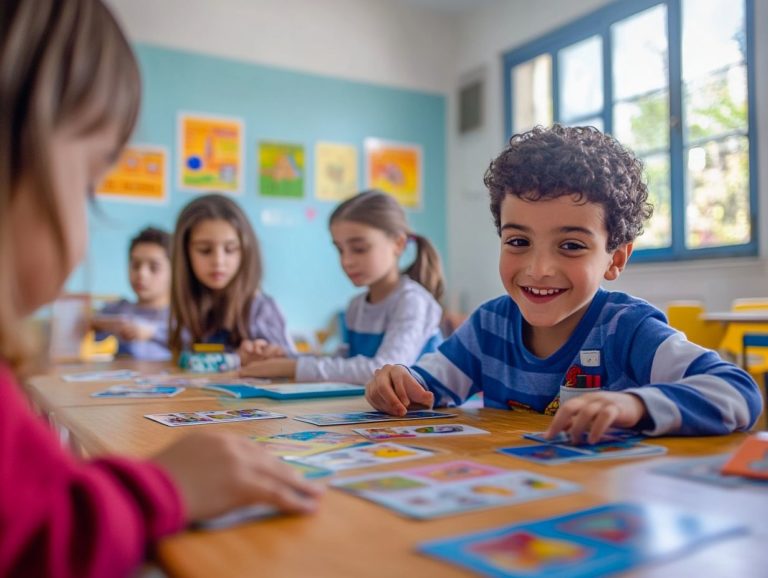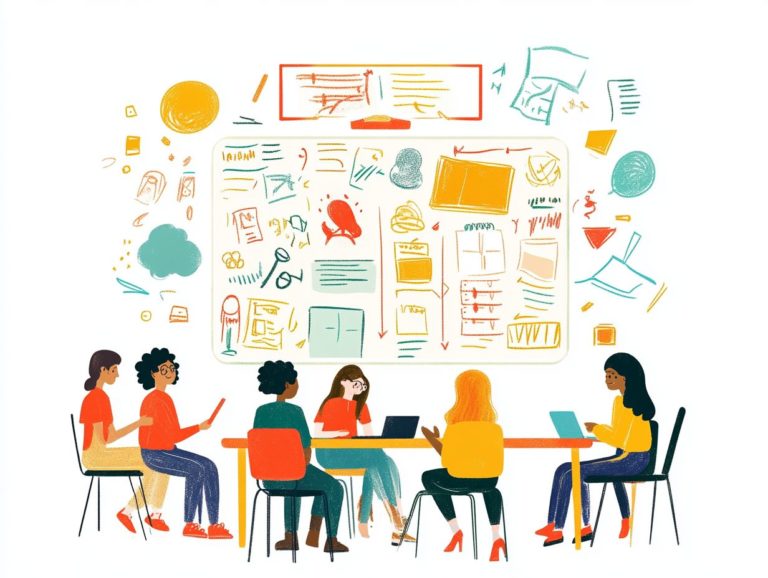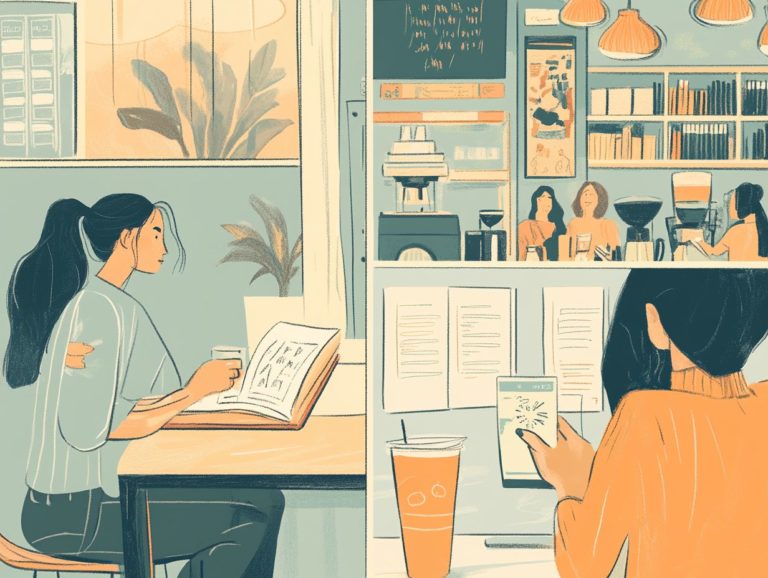using flashcards effectively in language learning
Flashcards are a fun and interactive tool that learners love! They provide an engaging method to enhance vocabulary retention and improve memory recall.
This article explores the many benefits of utilizing flashcards in language learning. It covers everything from selecting the most impactful words to designing visually appealing cards that catch your eye.
You’ll also find invaluable tips on seamlessly integrating flashcards into your study routine and maximizing their effectiveness. Whether you’re just starting out or have years of experience, these strategies are sure to elevate your language-learning journey!
Contents
- Key Takeaways:
- The Benefits of Using Flashcards in Language Learning
- How to Create Effective Flashcards
- Incorporating Flashcards into Language Learning
- Maximizing the Effectiveness of Flashcards
- Frequently Asked Questions
- How can I use flashcards effectively in language learning?
- Are there different types of flashcards that are more effective for language learning?
- How often should I review my flashcards?
- What are some creative ways to use flashcards in language learning?
- Can flashcards be used for all aspects of language learning?
- Tips for Creating Effective Flashcards for Language Learning
Key Takeaways:
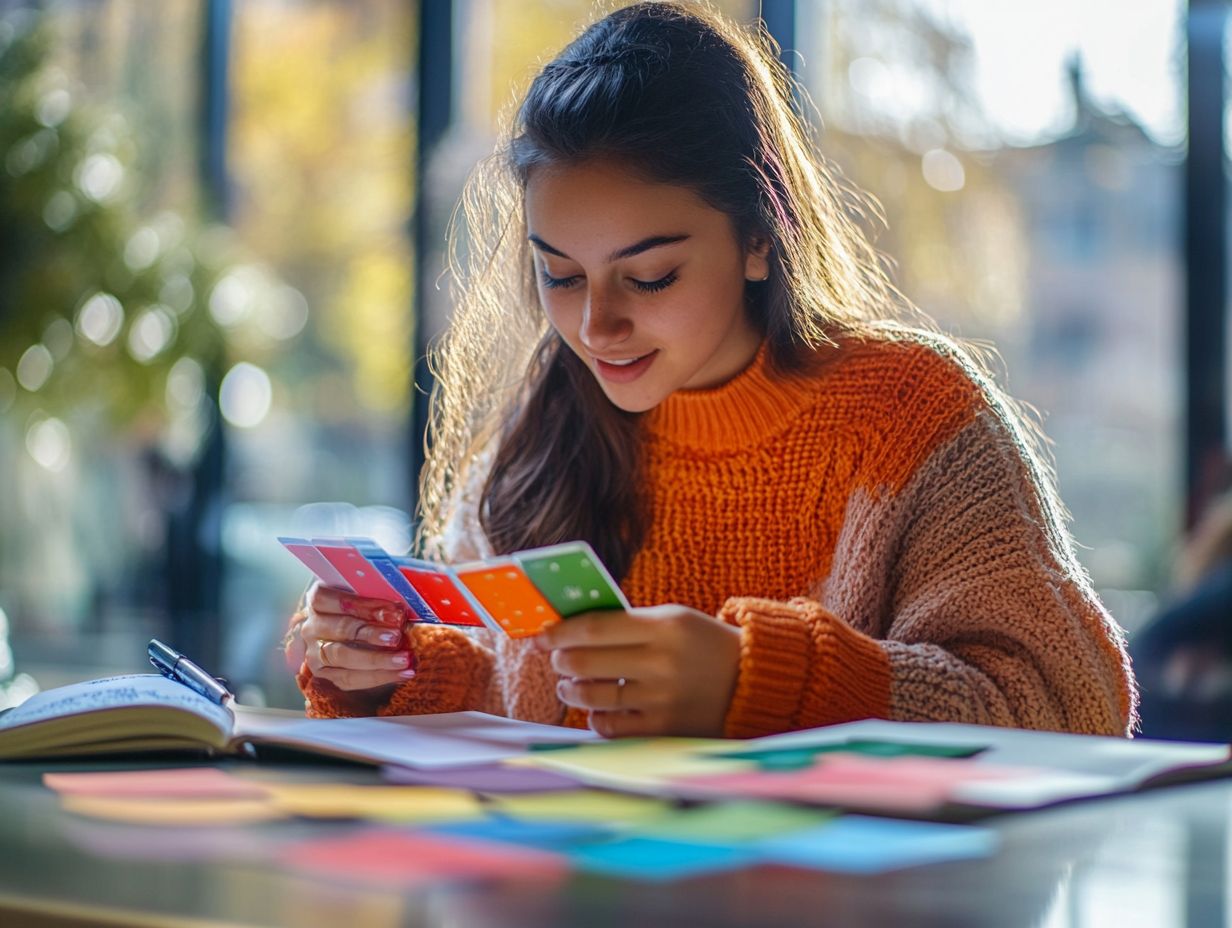
Flashcards are a powerful tool that will enhance your learning process by improving vocabulary and retention in language learning.
Designing engaging and clear flashcards with appropriate words and phrases is crucial for their effectiveness.
Integrating flashcards into study sessions and using them in various learning activities can enhance the overall learning process.
The Benefits of Using Flashcards in Language Learning
Using flashcards in language learning presents many benefits that can dramatically boost your vocabulary retention and overall learning efficiency.
By incorporating active recall trying to remember information without looking at the answer and spaced repetition reviewing material over increasing intervals you can make your language acquisition process more effective and engaging.
Flashcards are also versatile educational tools that can be customized to suit various study methods. They can be tailored to your unique learning style, creating a personalized learning experience that is both structured and impactful.
Improving Vocabulary and Retention
Flashcards serve as a powerful ally in your quest for vocabulary enhancement and retention. They promote active recall and foster personalized learning experiences tailored just for you.
By allowing you to create flashcards that cater to your specific vocabulary needs, you can organize them thematically, grouping words by subject or context. This targeted strategy strengthens your memory through enhanced associations and makes studying a more relevant endeavor.
Educational psychology highlights the value of spaced repetition and active engagement both of which are inherent to effective flashcard usage. You can easily adapt your flashcard sets to incorporate more complex terms, creating a dynamic pathway to vocabulary mastery.
Enhancing Memory and Recall
Using flashcards can significantly enhance your memory and recall by employing various techniques tailored to different cognitive skills and learning preferences.
These handy memory aids establish a structured approach to your review sessions, effectively alleviating the stress that often accompanies studying.
When you incorporate flashcards into your study routine, you engage with the material in bite-sized chunks. This method promotes active recall and reinforces connections between concepts, ultimately boosting your learning efficiency.
The psychological benefits of using flashcards are noteworthy as well; they heighten your engagement and confidence, helping to mitigate feelings of anxiety.
By breaking down information and offering regular, structured practice, these tools support better retention and lessen the overwhelming nature of traditional study methods.
How to Create Effective Flashcards
Crafting effective flashcards requires a careful mix of strategies that elevate their usability and engagement, whether they re digital or physical.
This process demands thoughtful content creation that resonates with proven techniques in language learning, ensuring the flashcards deliver engaging material tailored to your needs and study habits.
Get started crafting your flashcards today!
Choosing Appropriate Words and Phrases

Selecting the right words for your flashcards is vital for effective language learning. Take a moment to think about your personal language goals.
Are you preparing for travel, pursuing academic success, or advancing your career? Context is key.
Pick words that you ll hear often in daily conversations or areas that interest you. This makes learning relevant and helps you remember better.
Use resources like language apps, textbooks, or online communities to guide your vocabulary choices. Tailoring your words to fit your current experiences and needs boosts motivation.
This approach leads to deeper understanding and more meaningful language development.
Designing Engaging and Clear Cards
Creating engaging and clear flashcards requires attention to both visuals and sounds. This makes learning interactive and captivating.
Use bright images, stylish fonts, and short text to grab attention and improve retention. Adding sound clips of pronunciations turns your study time into an exciting adventure.
This combination enriches your learning space and sparks creativity. Personalize your study tools in a way that resonates with you.
These creative techniques can make studying more enjoyable and memorable.
Incorporating Flashcards into Language Learning
Using flashcards in your language learning journey is essential. Integrate them into structured study sessions and immersive activities.
Employ various practice techniques to create a lively learning environment. Flashcards can reinforce vocabulary and grammar in real-life situations.
This method improves retention and makes learning enjoyable.
Integrating Flashcards into Study Sessions
Adding flashcards to your study sessions can boost learning efficiency. Regular review is key to retention.
Set a structured review schedule to strengthen your long-term memory. Try spaced repetition reviewing cards at increasing intervals to minimize forgetting.
Test yourself actively with the flashcards instead of just rereading. This solidifies your knowledge.
Designate specific times each week for review sessions, and blend flashcard usage into your daily routines for optimal results.
Using Flashcards in Different Learning Activities
Flashcards can enhance a variety of activities, from language games to listening practices. They let you engage in fun memory matching games.
Pair cards with matching images or words to boost recall in an interactive way. Group quizzes turn learning into a friendly competition.
Imagine the excitement of quizzing each other! For solo study, flashcards are incredibly useful.
Flipping through cards helps retention and allows you to focus on areas for improvement. Whether in class or at home, using flashcards increases engagement and caters to different learning styles.
Maximizing the Effectiveness of Flashcards
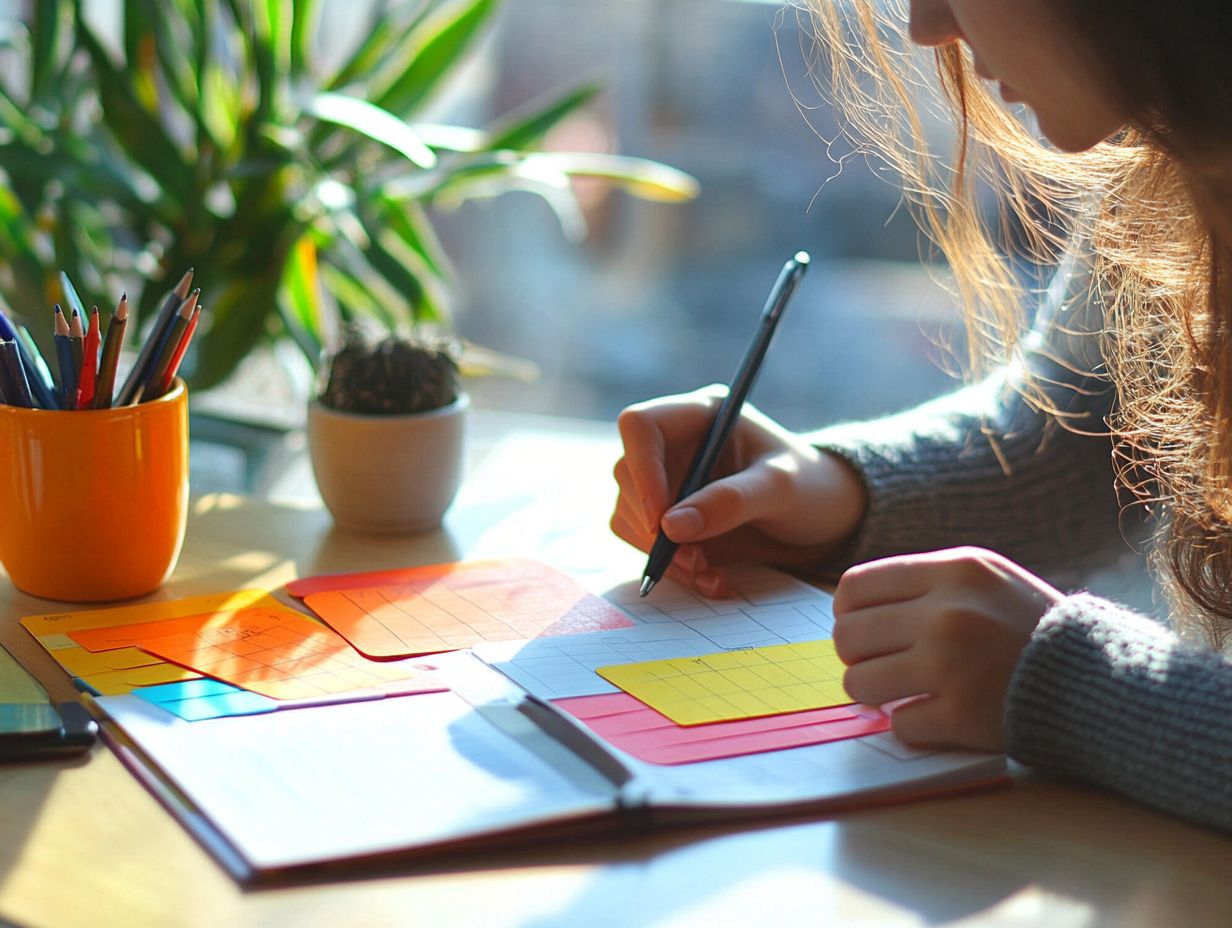
To make the most of your flashcards, learn key strategies and avoid common mistakes. This ensures your learning remains efficient.
Tips for Reviewing and Revising Flashcards
Reviewing and revising flashcards are crucial for effective learning, using memory techniques that enhance understanding and retention.
By employing strategies like spaced repetition and active recall, you can significantly boost your retention rates and mastery of the material. Spaced repetition means reviewing information at increasing intervals to strengthen memory and avoid cramming, which promotes long-term retention.
Active recall prompts you to actively retrieve information from memory, rather than reviewing it passively.
When revising your flashcards, focus on clarity and engagement. Use clear visuals, add context, and incorporate thought-provoking questions to enhance your study sessions. These practices align with effective learning principles and make the review process more enjoyable and impactful.
Avoiding Common Mistakes with Flashcards
Avoiding common mistakes with flashcards can boost your learning efficiency and alleviate any flashcard anxiety.
To harness the power of this study technique, avoid cramming too much information onto a single card. This can lead to confusion and frustration, defeating the purpose of effective retention.
Instead, break down complex concepts into bite-sized notes that are easier to digest and recall. Many learners overlook the importance of regular review sessions, which are crucial for memory consolidation.
Establishing a consistent schedule for revisiting your flashcards keeps your knowledge fresh and easily retrievable. Incorporating spaced repetition and varying your test formats can further enhance your memorization efforts, creating a more structured and rewarding learning experience.
Frequently Asked Questions
How can I use flashcards effectively in language learning?
To use flashcards effectively in language learning, first ensure the words or phrases you study are relevant to your proficiency level. Create flashcards that include the word or phrase in the target language and its translation or definition. For more tips, consider using flashcards effectively by reviewing them regularly and trying to use them actively in conversation or writing practice.
Are there different types of flashcards that are more effective for language learning?

Yes, different types of flashcards can boost your learning. Some people prefer traditional paper flashcards, while others find digital flashcards or apps more convenient. Some language learners benefit from using flashcards with images or audio recordings to aid visual or auditory learning styles.
How often should I review my flashcards?
The frequency of reviewing flashcards varies for each individual. However, it s generally recommended to review them daily or every other day to reinforce your learning and retention of new vocabulary. As you become more familiar with certain words or phrases, decrease the frequency of reviewing those flashcards.
What are some creative ways to use flashcards in language learning?
Aside from flipping through flashcards, there are many creative ways to use them in language learning. Group your flashcards into different categories, create games with them, or use them as prompts for conversation practice with a language partner. You can also create personalized sentences or stories to practice using the language in context.
Can flashcards be used for all aspects of language learning?
Flashcards are a fantastic tool for learning vocabulary and basic grammar, but they may not be as effective for advanced concepts or skills like complex grammar rules or conversational fluency. It s important to use flashcards alongside other methods and resources to fully develop your language skills.
Tips for Creating Effective Flashcards for Language Learning
Creating flashcards for language learning can be fun and rewarding. Keep them organized and concise.
Use clear and legible handwriting or text. Include only one word or phrase per flashcard.
Try using different colors or adding images to make memorization easier.
Review your flashcards regularly. This will reinforce your learning and help you track your progress.

